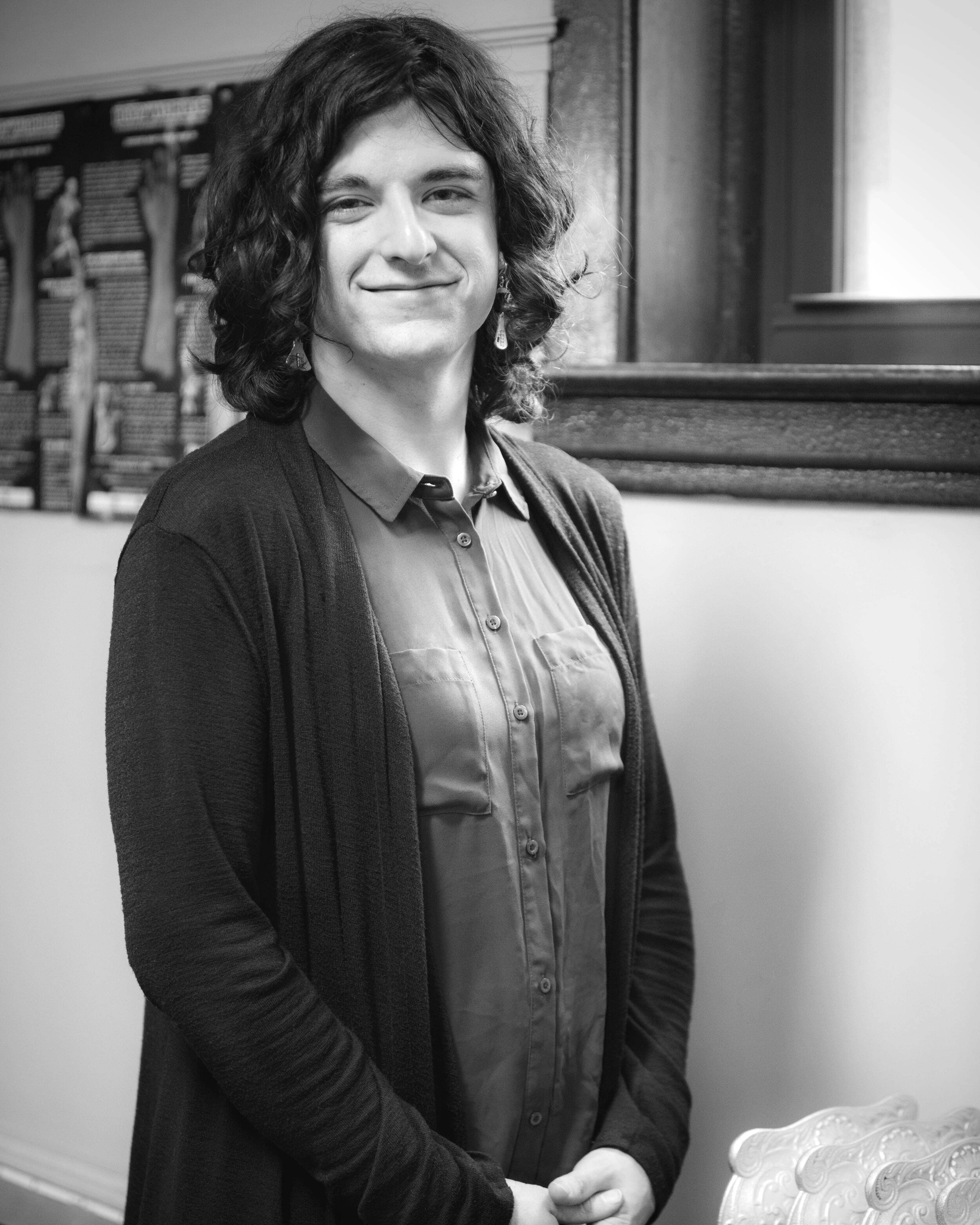Chair - Math, Science, and Technology
Melissa Metelits became a faculty member in 2018 and teaches Algebra II, Precalculus, AP Calculus BC, and AP Computer Science. She has taught and tutored a variety of subjects in Philadelphia, her home town, and in Chicago.
Alex Cassidy joined The Academy in 2018, and earned their Bachelors in Science Education from the University of Florida. Alex comes to The Academy from Wellsprings Friends School in Eugene, OR.
Courses within the newly established and comprehensive Department of Science, Math, and Technology help students develop logical thinking in order to understand the world around them. Courses center around developing students' thinking and problem solving.
These three disciplines, like any art form, are each comprised of a coherent and precise language, with its own logic, rules, and beauty. Through carefully tailored and differentiated curriculum, Academy students are inspired, challenged, and encouraged, regardless of ability, to obtain excellence and satisfaction in their work. The courses emphasize disciplined experimentation and encourage intellectual risks and creativity.
The mathematics courses range from algebra to BC calculus, with numerous AP and honors offerings. Each student will graduate having at least one course in biology, chemistry, and physics. There are also a variety of science and technology electives. The collaboration between all three of these disciplines provides students with a cohesive, consistent education that allows for deep and rich cross-curricular experiences.
Science, Math, and Technology Department Courses
Honors Algebra I builds upon the knowledge students have gained in previous classes and lays the foundations for rigorous mathematical studies. Topics are covered at an advanced pace and include but are not limited to: the Real Number System, absolute value, equations and inequalities, graphing, linear and quadratic functions, systems of equations, exponents, polynomials, radicals, and rational expressions.
Algebra II extends and builds upon concepts learned in Algebra 1 in order to improve problem-solving skills. Algebra 2 continues the study of algebra with a focus on the analysis of functions, including polynomial, rational, exponential, and logarithmic functions. Emphasis will be made on solving, graphing, transforming, and modeling these functions.
Honors Algebra 2 continues the rigorous study of algebra at an advanced pace with a focus on the analysis of functions, including polynomial, rational, exponential, and logarithmic functions. Emphasis is made on solving, graphing, transforming, and modeling these functions.
Geometry introduces students to the basic principles of Euclidean geometry. Students will learn key definitions, symbols, notations, theorems, and properties of geometric figures which serve as the foundation for the course. Emphasis is placed on developing deductive reasoning and logical thinking skills through the use of geometric proof. Topics explored include: basic definitions, lines, angles, triangles, quadrilaterals, circles, polygons, solids, congruence, similarity, ratio and proportion, transformations, elementary trigonometry, and formulas for perimeter, area, surface area, and volume.
Honors Geometry is designed to meet the needs of students who are capable of studying geometry in greater depth and at a faster pace. The course focuses on plane and solid geometry. Students will develop deductive reasoning skills to solve problems and write complex proofs, will learn a logical approach to problem solving, and will improve their ability to communicate both concrete and abstract ideas. Topics explored include: basic definitions, lines, angles, triangles, quadrilaterals, circles, polygons, solids, congruence, similarity, proportion, trigonometry, fractals, three-dimensional coordinates, transformations, and formulas for perimeter, area, surface area, and volume.
Precalculus continues the study of algebraic topics in preparation for calculus. Semester One will focus on trigonometry while second semester will include the study of polar graphs, vectors, conic sections, sequences, and series. Students successfully completing the class should be ready for AP Calculus AB, AP Statistics, or Discrete Mathematics the following year.
Honors Precalculus continues the rigorous study of algebraic topics at an advanced pace in preparation for calculus. First semester will focus on trigonometry while Semester Two will include the study of polar graphs, vectors, conic sections, sequences, series, and probability. Students successfully completing the class should be ready for AP Calculus AB.
Discrete Math covers a variety of college-level topics in mathematics and their relevance to contemporary science and society. Students will explore topics including but not limited to: logic, sets, calculus, probability, historical and philosophical foundations of mathematics, game theory, and geometry.
AP Calculus AB focuses on understanding mathematical concepts using graphical, numerical, and analytical methods. Students will be expected to communicate their understanding numerically as well as through the use of graphs and written explanations. Extensive use will be made of the graphing calculator, and students will take the AP exam at the end of the year for potential college credit.
Chemistry is the study of matter and how it changes. Throughout this course, students will learn about key concepts such as characteristics of matter, chemical reactions, stoichiometry, and atomic chemistry, all of which will cultivate analytical, quantitative, and critical skills. Students will have many opportunities to perform laboratory experiments designed to deepen their understanding of course concepts; these labs will incorporate chemistry concepts as well as relevant technology, such as the use of Nspire calculators to perform precise measurements. Ongoing scientific discoveries and research will be discussed in order to enhance scientific literacy.
AP Calculus BC is taken after successful completion of AP Calculus AB. The BC exam covers the first two semesters of college calculus. Material from the first semester of college calculus (the AB curriculum) is reviewed at the beginning of the year and is followed by the new material. Additional topics beyond the AP curriculum are often covered, such as linear algebra, fractals, and/or basic programming. This course is often taught as an independent study.
AP Statistics covers the same material in a typical college-level introduction to statistics course. This class can be split into four unequal parts: analysis of patterns in data and display of data, collection of valid data through well-developed plans, usage of probability to anticipate data distribution (there is order in the universe!), and employment of statistical inference (how confident we are about a particular hypothesis). Students will take the AP exam in May for potential college credit.
Biology challenges students to explore concepts that explain living systems. Themes that undergird units of study include living systems in balance, and the return of systems impacted by internal and external forces to new states of balance. Units of study include ecology, cell biology, comparative anatomy of invertebrates, and genetics and evolution. Students practice scientific process skills such as proper procedures to generate and analyze data so that results help support concepts. Issues investigated in Biology include the challenges of genetic engineering as well as the threats to biodiversity and to the health of local communities on account of invasive species and habitat loss.
Anatomy and Physiology is an advanced laboratory course in the life sciences which challenges students to relate the human body to their training in the arts. The course is organized around two themes. The first is how the human body is a system in balance. Changes in the environment that upset this balance cause the body to return to a new state of balance. The second is how body structures complement the functions they help serve. Dancers are encouraged to take Anatomy and Physiology because the study of the muscular and skeletal systems complements their study of movement. Visual artists are strongly encouraged to take the course in order to better render the human figure. Thespians too benefit because a better understanding of the human body can augment their training to act on the stage.
Physics is the study of the fundamental aspects of the universe. Throughout this course, students will learn and study the major facets of physics such as classical mechanics, optics, waves, electricity and magnetism, and modern physics. There will be many opportunities to perform laboratory experiments and participate in group projects that bridge course concepts and relevant technology.
AP Computer Science Principles introduces students to the techniques and methods of computer programming as well as to the history and theory of computer science. This class will be taught using the Java language, and students may receive college credit by performing well on the cumulative AP Computer Science Principles test. Students participating in this class have the opportunity to perform many in-class programming activities and labs, as well as to work on larger thematic projects that may include writing a text-based video game, writing scientific programs drawing knowledge learned in previous science classes, etc.
Health and Wellness focuses on taking a holistic approach to well being. This course explores biological, psychological and social aspects of human sexuality, nutrition, healthy and harmful substances, and relationships. Topics include sexual identity, gender, effects of cultural and environmental influences on human relationships and behavior, promoting good physical and mental health and well-being, effective communication strategies for conflict resolution, navigating relationships with technology, and the impact of current events on personal and global health. Curriculum will draw from Planned Parenthood's "Get Real" Comprehensive Sexual Education program, excerpts from "Consent: The New Rules of Sexual Education" by Jennifer Lang, FDA and CDC guidelines on nutrition, stress, and sleep, as well as articles from current events news sources such as the New York Times, National Geographic, and BBC.
This class covers a history of our battle to maintain and improve the health of both humans and our food, the power of viruses, bacteria, and insects to help and harm us, and the innovative and often destructive ways we have interacted with them in the past. Topics will include the history of disease and the treatment of infection, vectors for disease transmission, insect anatomy, pollination, agricultural pest management, parasites, and how they impact people today. This course serves as an introduction to the topics of Entomology, the study of insects, and Epidemiology, the study of infectious diseases. This is a lab based course: be prepared to work with both live and dead insects and bacteria!
Astronomy is the scientific study of the contents of the entire Universe. This course will cover the composition and structure of the universe through research, labs, simulations, and discussions. The content includes, but is not limited to, historical astronomy, astronomical instruments, the solar system, the earth as a system in space, black holes, the earth/moon system, the sun as a star, and stars.
Science Discourse and Debate encourages students to research current popular science topics/issues. The students learn a brief introduction to the science behind each topic before choosing the side of the debate that they support. They then get a chance to research their own evidence to support their claims during the class debate.
The aim of this class is to teach fundamentals of science and mathematics through scientific literacy and experimental design. Along with some attention to epistemological considerations, exploring historical context will be essential. In the course, you will be required to construct your own thought experiments and provide a detailed explanation of the scientific or mathematical phenomenon behind your experiment. The course will require a considerable amount of writing, including short papers on the strengths and limitations of the particular arguments advanced by our sources, extensive research papers on the philosophical questions raised by thought experiments, the scientific and mathematical background of the thought experiment, and detailed presentations representing the process and conclusion of the thought experiment.




Algebra I provides students with the time and focus needed to develop fundamental ways of thinking mathematically. Students will engage with ideas and problems as preparation for moving from concrete problem solving to abstractions and general theories. Topics covered include but are not limited to: the Real Number System, absolute value, equations and inequalities, graphing, linear and quadratic functions, systems of equations, exponents, polynomials, radicals, and rational expressions.